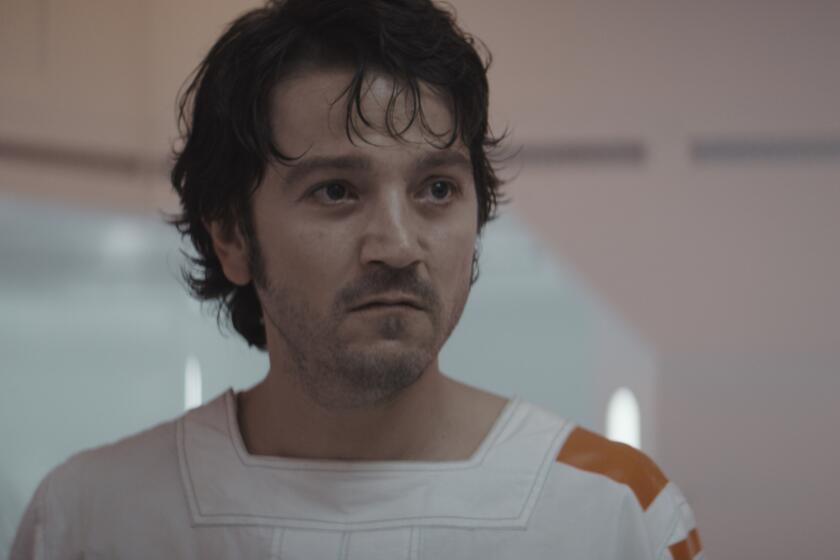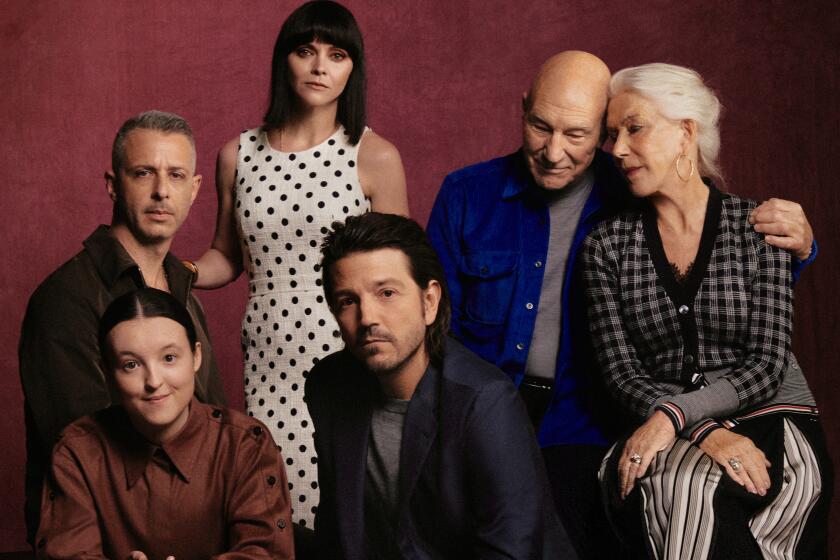For Diego Luna and Tony Gilroy, the free hand and clear ending make ‘Andor’ a dream gig
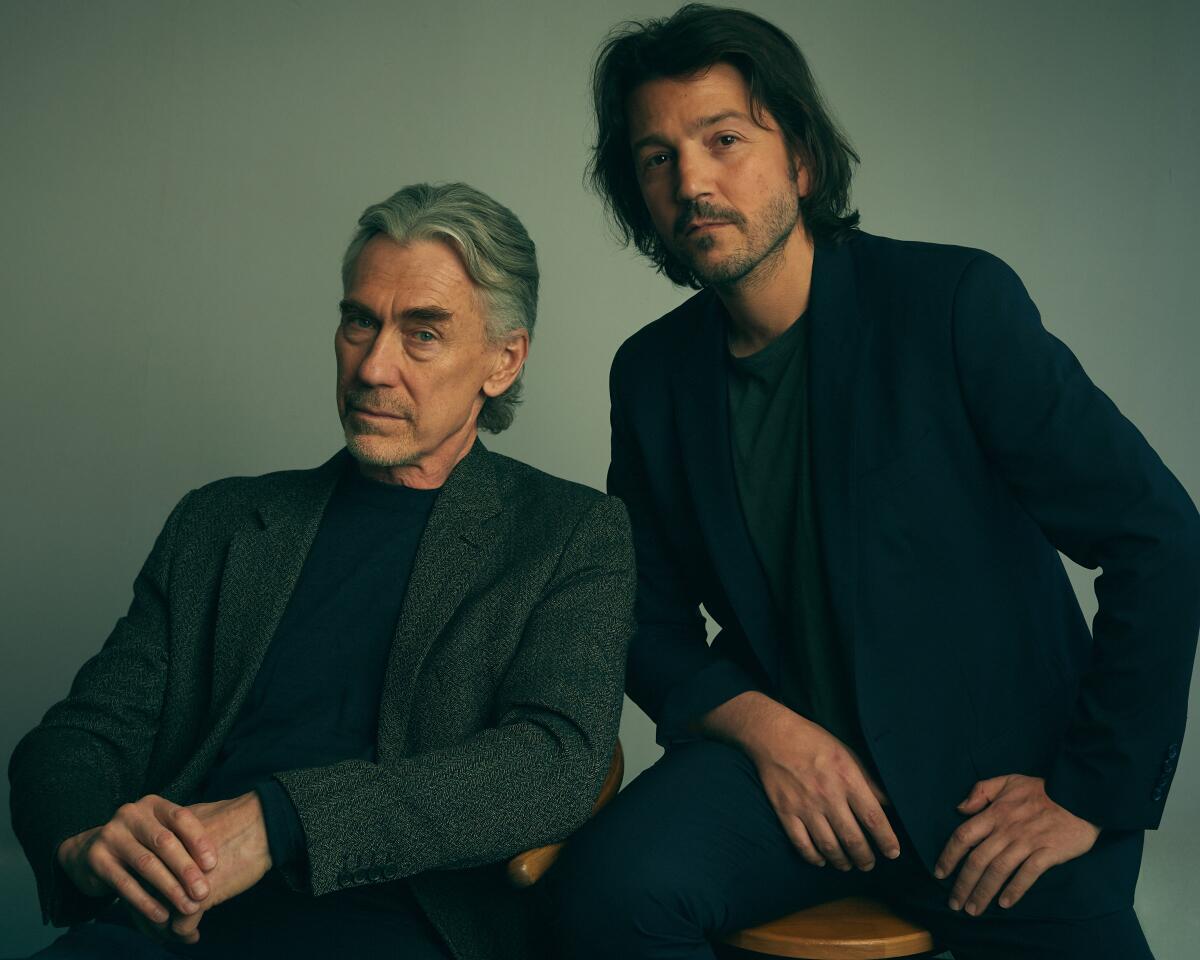
- Share via
Growing up in Mexico, Diego Luna couldn’t imagine he might one day shoot a blaster or fly a spaceship. His character, Cassian Andor, is now an integral part of the “Star Wars” landscape, thanks to the film “Rogue One” and the Disney+ series “Andor,” but that level of inclusion hasn’t always been the case in on-screen sci-fi stories.
“I’d never heard an accent like mine in ‘Star Wars,’” Luna says. “I never pictured myself as someone who could portray a role in this universe. I was a fan of the first films when I was a kid, and it was interesting to reconnect with that but at the same time being asked to do something so [much] further away from that.”
Luna initially portrayed Cassian, a Rebel Alliance officer willing to sacrifice himself to save the galaxy, in 2016’s “Rogue One: A Star Wars Story.” It was there he connected with Tony Gilroy, who was brought on board for extensive reshoots. “Andor,” a prequel to the events of “Rogue One,” got the greenlight soon after, and Gilroy officially joined as showrunner in 2019. The pair were immediately on the same wavelength with their vision for the character and his journey, as well as the general tone of the show.
How a prequel of a prequel, starring Diego Luna as future Rebellion spy Cassian Andor, became the jewel in the crown of ‘Star Wars’ television.
“I was never anti-‘Star Wars,’ but when I came on ‘Rogue’ I didn’t know that much about it,” Gilroy says in an April video call with Luna, the showrunner from New York and the actor in Madrid. “It wasn’t a fascination for me. But the piece of material, the scale of the landscape and its subject matter coincided with a whole bunch of things that I was really interested in doing.”
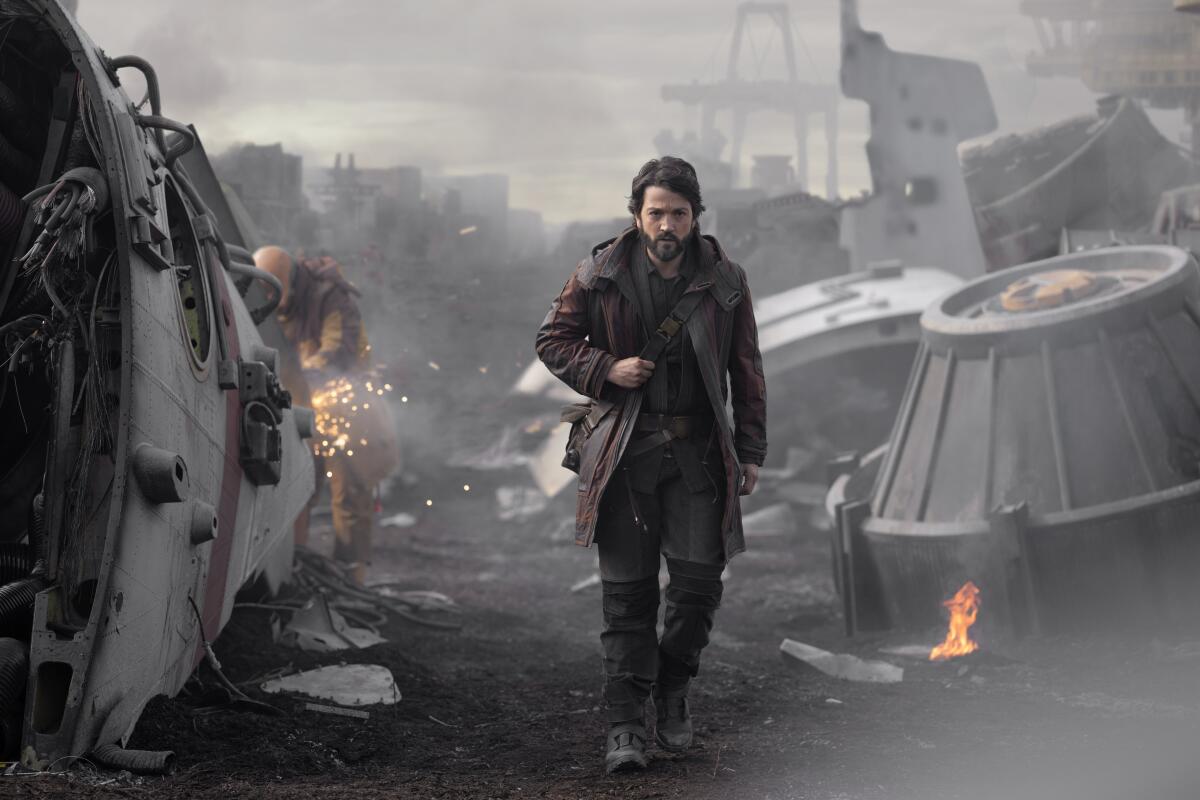
“We had the responsibility of being different,” Luna adds. “[We knew] we were meant to be unique in terms of what had been done in this universe. This universe is so rich and interesting as a metaphor to reflect the world you and I live in. It’s a great tool, this galaxy far, far away. It was fascinating to find out that there was so much room there to play.”
Gilroy, who says he came into the project with a “big bag of naiveté,” found himself digging deeper and deeper into the potential story lines. The scope of the first season, which opens five years prior to the events in “Rogue One,” just kept growing, largely because Gilroy wanted to do something “big and wide and with a lot of characters.” The series became a chance to reflect on overarching human themes from the perspective of both the rebels and the oppressor while keeping the action grounded in realistic characters and emotion.
“I was in the mood to sum up all the things I think about history and revolution and betrayal and everything,” Gilroy says. “And I had a free hand. We’re exempted from contemporary analysis. It’s a classic thing of science fiction — you can always comment on what’s going on in your society by doing a western or doing science fiction — there’s really nothing off-limits, and there’s very little that’s radioactive.”
In a roundtable conversation, Diego Luna, Helen Mirren, Bella Ramsey, Christina Ricci, Patrick Stewart and Jeremy Strong dive deep into their appreciation of writers, mothers and “not giving a f--”
“When we found a way to make it personal, to make it about the intimate, it was delicious to play,” Luna adds. “It’s fantastic to have the chance to explore very simple things, very simple moments of life, and then pull everything together and say, ‘This is a revolution, and it’s really complex.’”
The first season spans 12 episodes, which feature three distinct narrative arcs. The story shifts its setting frequently and pivots among Cassian’s immersion into dangerous Rebel plots, the politics of the Imperial Senate and the bureaucracy of Imperial Security Bureau, which is tracking Cassian. Many of the cast, which also includes Stellan Skarsgård, Andy Serkis and Fiona Shaw, embody characters never before seen in the “Star Wars” universe. Unlike other recent “Star Wars” shows, “Andor” shoots primarily on location, using practical effects when possible, a vision that trickled down from “Rogue One.”
“The idea and vision from the beginning [was] to be an homage to the genesis of ‘Star Wars’ and how it was done in cinema in 1978,” Luna says. “We were asked to work with real props and for everything to be mechanical and be moving in front of us. If you were going to interact with a droid, it had to have wheels and move and they’d have to have someone behind controlling it. We owe a lot to that because when that film came out people were talking about that.”
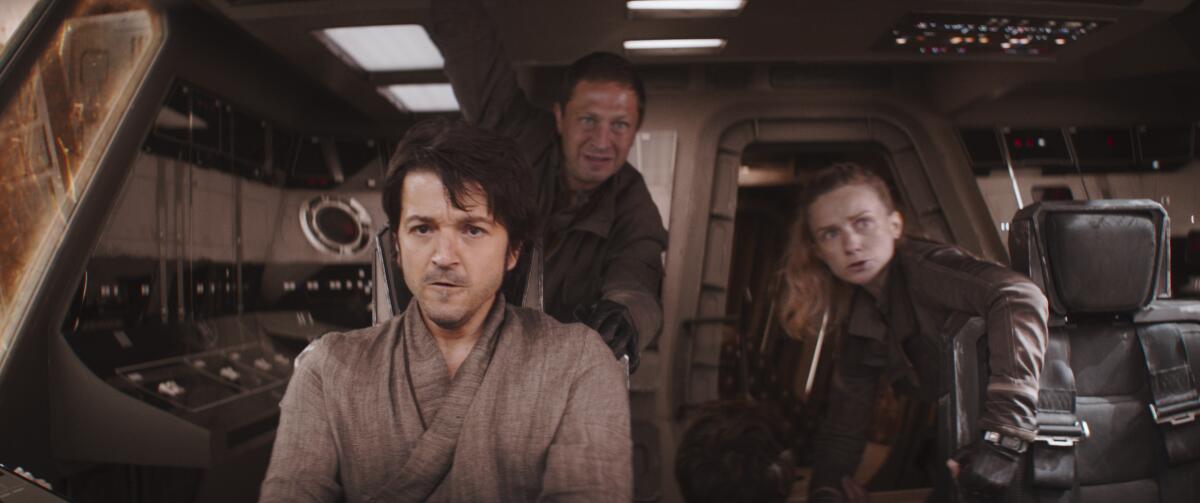
Production on Season 1 spanned seven months in the UK, moving between Pinewood Studios and locations such as the beach town of Cleveleys and Scotland’s Cruachan Dam. Toby Haynes, Susanna White and Benjamin Caron each directed multiple episodes, which required massive set pieces and carefully plotted stunts (as well as a crew of 1,400). For Gilroy, filming out in the world as much as possible helped to keep the story’s “emotional turbine” moving.
“There’s a residue of the adventure of making the show in the show,” Gilroy says. “A lot of times that can leak in. This was an adventure to do and we’re doing it one more time right now and it’s still an adventure. It’s not just the scale of the show—I think there’s some aspect of how far we’re going and how long it’s taking us and how committed we are that bleeds off the frame a little bit.”
From the outset, Gilroy and Luna knew Cassian’s fate, as do the viewers. But although that means “Andor” will last just two seasons (the second will premiere in 2024), the conclusive nature of the storytelling has been beneficial. Cassian’s death created a useful bookend to work toward, rather than Gilroy simply writing a character with an uncertain amount of seasons ahead of him.
“We like the idea that he dies,” Gilroy says. “That’s the reason we’re here. That was the pitch for the show: We have this guy in ‘Rogue,’ and he’s all singing and all dancing and he can fly and he can shoot and he’s the most trusted military intelligence officer that they have and he can lie and he can seduce and he’s smart enough to change his mind when things happen. He’s willing to sort of atone for his previous transgressions. So who is this dude? Let’s pick him up on the worst day of his life. Let’s see what we can do to take that cockroach and turn it into a butterfly at the end.”
Our BuzzMeter panel of veteran TV journalists predicts the winners in 14 categories of the 2023(?) Emmys. You can, too, in our weekly polls.
He adds, “Of the many things that we haven’t known while making the show, and there are multitudes, the one thing we knew is where we were going all the time.”
For Luna, one of the benefits of “Andor” being a “Star Wars” story is that nothing goes through a focus group. Everything remains a secret. “That freedom is interesting,” Luna says. “It reminds me of cinema when I was a kid. You would go and be surprised by what was in front of you. You could just see a poster, and probably the name of an actor or the director would bring you in. But that was it. You would be surprised, and we had that ability here, because no one knew what we were going do.
“It’s interesting to call the show ‘Andor,’ because you might think you will go on a journey with a guy. And suddenly you’re in a revolution and seeing what needs to happen for a bunch of people to react to the system and to do something and bring change. It can be as complicated as you want, because no one has expectations, and you can define the limits yourself.”
While “Andor” examines the origins and impact of revolution, it was important for Gilroy never to take a stance. Instead, he wanted to shine a broad light in order to show everyone’s motivation. In writing the series, Gilroy drew on decades of consuming pop culture, news and history, as well as his own experiences as a writer and director.
“You very rarely have a chance to stand back and use whatever is in there,” Gilroy says. “And that’s the great thing about this show—the opportunity of the show is it takes absolutely everything that I know how to do and everything I ever learned in my entire life of filmmaking. I suppose it’s an odd thing to say, but I feel really fully accessed in this show. I get to use everything. It’s overwhelming because it never stops and it eats you alive. But the thing that keeps you going and keeps you surfing is the fact that you keep finding you knew you wanted to say but forgot you had.”
The inherently curious nature of the series differentiates “Andor” from many other “Star Wars” stories. It gives the same scope and consideration to prisoners as it does to leaders and politicians. The galaxy’s uncelebrated citizens are the heroes, even if they’re flawed and, like Cassian, sometimes misguided.
“That’s one of the things that makes it so special in this universe,” Luna says. “I don’t think there’s ever been so much care and commitment into telling the story on both sides of the regular people. What it is to have to make the choices they have to make and to live the everyday life. If you just approach it from good and bad, black and white it’s not interesting. It’s so interesting and so cool in this show that we get the opportunity to build roles with the same amount of detail and time that we see with Cassian.”
More to Read
From the Oscars to the Emmys.
Get the Envelope newsletter for exclusive awards season coverage, behind-the-scenes stories from the Envelope podcast and columnist Glenn Whipp’s must-read analysis.
You may occasionally receive promotional content from the Los Angeles Times.
